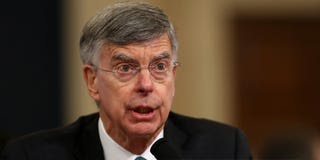
(Bloomberg) — Two State Department officials responsible for U.S. policy in Ukraine testified Wednesday in a House impeachment hearing, giving the public its first live, televised look at the evidence against President Donald Trump.
Ambassador William Taylor and Deputy Assistant Secretary of State George Kent answered questions from Democratic and Republican staff and members of the House Intelligence Committee for several hours.
Neither were on the July 25 phone call between Trump and Ukrainian President Volodymyr Zelenskiy that is at the center of the impeachment inquiry.
These are the key takeaways from the hearing so far:
Taylor reveals newly disclosed Trump exchange on Ukraine
Taylor, the acting ambassador to Ukraine, testified about a previously undisclosed exchange between Trump and Gordon Sondland, the U.S. ambassador to the European Union, on July 26 — the day after the Trump-Zelenskiy call. Taylor said he learned of Sondland’s conversation with Trump only last week from an embassy staffer.
According to Taylor’s account, Sondland called Trump by mobile phone from a Kyiv restaurant where U.S. officials were dining after meeting with Zelenskiy. Trump was speaking so loudly that one of Taylor’s staff members could hear both sides of the call.
The staffer said Trump asked Sondland about “the investigations.” Taylor understood that term as referring to Trump’s request that Zelenskiy investigate former Vice President Joe Biden, his son Hunter, and Burisma Holdings, an energy company on whose board Hunter Biden served.
Sondland responded that the Ukrainians were ready to move forward.
Taylor said his staff member asked Sondland what Trump thought about Ukraine.
“Ambassador Sondland responded that President Trump cares more about the investigations of Biden, which Giuliani was pressing for,” Taylor said.
Diplomats uncomfortable with Giuliani’s ‘irregular’ channel
Both diplomats were deeply skeptical of the role Rudy Giuliani — the former New York mayor and Trump’s personal lawyer — was playing in Ukraine policy.
“In mid-August, it became clear to me that Giuliani’s efforts to gin up politically motivated investigations were now infecting U.S. engagement with Ukraine, leveraging President Zelenskiy’s desire for a White House meeting,” Kent said.
Kent said Giuliani was engaged in an effort to “smear” the former ambassador to Ukraine, Marie Yovanovitch, and other U.S. diplomats.
Taylor said he realized in July that there was an “irregular policy channel” guided by Giuliani working to condition a White House meeting on Ukrainian investigations of the Bidens and the 2016 U.S. elections.
Both men said Giuliani was pushing Trump’s political interests.
“I believe he was looking to dig up political dirt against a potential rival in the next election cycle,” Kent said.
“I agree with Mr. Kent,” Taylor said.
Republicans push back on ‘fourth-hand rumors’
Republicans defending Trump presented a variety of procedural and substantive arguments against the Democratic-led impeachment inquiry.
Devin Nunes, the top Republican on the intelligence committee, said the witnesses’ testimony was “typically based on second-hand, third-hand, and even fourth-hand rumors and innuendo.”
Nunes said the diplomats were “remarkably uninformed” about Trump’s theory that it was Ukraine — not Russia — that sought to interfere in the 2016 election. That gave Trump good reason to send Giuliani to Ukraine to investigate, he said.
But at times, Republicans resorted to arguing that Trump’s use of his personal lawyer to conduct Ukraine policy was unusual but not impeachable.
“In fairness, this irregular channel of diplomacy, it’s not as outlandish as it could be, is that correct?” said Steve Castor, the attorney handling questioning for the Republicans.
“It’s not as outlandish as it could be,” Taylor said, laughing. “I agree with that.”
Witnesses explain why withholding of aid was ‘alarming’
Both witnesses conceded that they hadn’t spoken to Trump — or even Giuliani — and so could not testify directly about Trump’s aims in withholding aid.
But they were able to testify from the front lines of diplomacy about the importance that the new Ukrainian government placed on American support. Zelenskiy, who had just formed a government when he spoke to Trump, wanted a meeting in order to convey legitimacy and give him leverage against Russian President Vladimir Putin, they said.
“It’s one thing to try to leverage a meeting in the White House,” Taylor said. “It’s another thing, I thought, to leverage security assistance, security assistance to a country at war dependent on both the security assistance and the demonstration of support.
“Security assistance was much more alarming,” he said.
But Republicans countered that there was no harm because the aid was eventually released.
“Two facts,” said Representative Elise Stefanik of New York. “Number one, Ukraine received the aid. Number two, there was no investigation.”
*story by Bloomberg